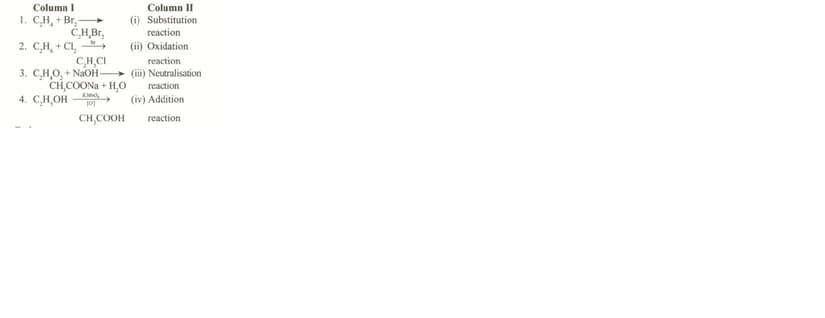Chemical Properties of Carbon Compounds
Chemical Properties of Carbon Compounds: Overview
This topic covers concepts, such as Chemical Properties of Carbon Compounds, Substitution Reactions of Hydrocarbons, Formation of Coal and Petroleum & Combustion of Coal and Petroleum etc.
Important Questions on Chemical Properties of Carbon Compounds
Which of the following gas is released in combustion of coal.
Which one of the following is used as the antiknock compound?
Elimination of hydrogen bromide from -bromobutane results in the formation of
Propyne and propane can be distinguished by
What is formula of carbon tetrachloride?
Match the items of column I with those column II.
column I column II
1. Fullerene (i) Dry lubricant
2. Coal (ii) Hardest substance
3. Diamond (iii) Amorphous carbon
4. Graphite (iv) molecule
Match the items of column I with those of column II.

The following compound were treated with water. Which of these will decolourise it?
Which catalyst is used in the hydrogenation of vegetable oils to form vegetable ghee?
Which of the following statements are correct for carbon compounds?
(i) These are good conductors of electricity.
(ii) These are poor conductors of electricity.
(iii) These have strong forces of attraction between their molecules.
(iv) These do not have strong forces of attraction between their molecules.
Chlorine reacts with ethene to form
Which of the following represents a substitution reaction?
Which of the following compounds shows addition reactions?
When ethane is burnt in excess of air, the products of combustion are.
Hydrogenation of vegetable oil in the presence of palladium or nikel as catalyst is an example of.
In which of the following compounds, group is the functional group?
The major costituent of LPG is.
The process of burning any substance in air is called.
The final product of prolonged chlorination of methane in the sunlight is.
The chemical formula of methyl propionate is.
